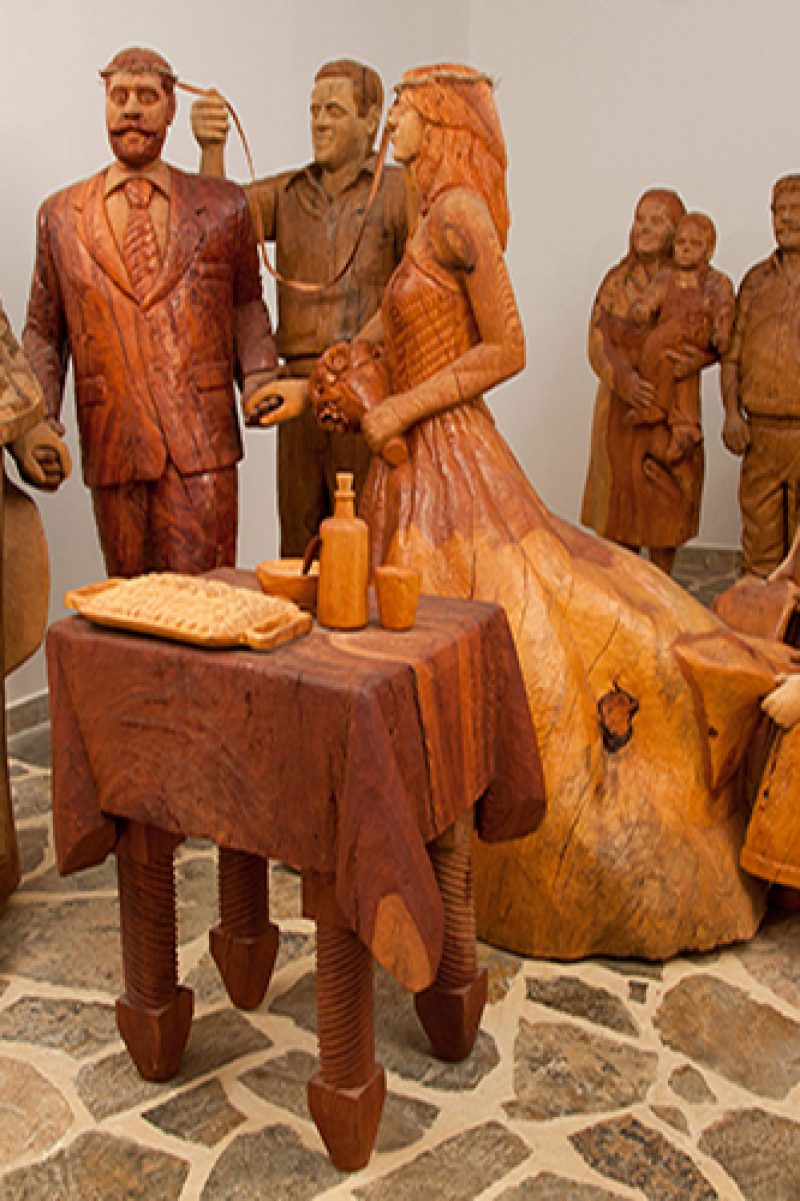

11°C
The Museum of Woodcarving, at the foot of Psiloritis and in the heart of Crete, is a unique cultural and artistic destination. Located in Axos Mylopotamos, just an hour from Rethymno and Heraklion, it houses the permanent collection of self-taught woodcarver Georgios Koutantos, who has been involved in woodcarving since the age of nine. The museum was inaugurated in 2010.
In a modern, two-story space of 300 square meters, more than a hundred woodcarvings are exhibited, all created with a simple hammer and scalpel. The subjects of the sculptures are drawn from Cretan folklore, nature, mythology and religious tradition. Works such as “The Lyrar”, “Grandfather and Grandmother”, “Kri Kri”, “The Eagle and the Snake” and “The Little Mermaid” stand out.
Apart from the aesthetic pleasure, the visitor has the opportunity to discover elements of Cretan society, customs and traditions, traditional occupations, social structures and historical events. Of interest are the wooden trunks in which marbles from the Cretan revolutions were found.
Each exhibit is accompanied by an informative text in Greek and English, indicating its title, dimensions, type of wood, date of creation and symbolic content. Most of the works have physical dimensions, while some are impressive in size, such as “The Eagle and the Serpent” (six meters long) and “My Parents and I” (three meters high).
A visit to the museum can be combined with the important antiquities of Axos and the attractions of the area, offering a complete experience of art, history and tradition.
*Photos come from the official website of the museum.
Museum
Popular Culture
Axos Mylopotamos, Rethymnon
+30 6937691387
15 April – 31 October
Monday – Sunday: 10.00 – 17.00
1 November – 14 April
Sunday: 10.00- 17.00
For the Rural Greece accessibility is fundamental to enhancing an inclusive tourism experience. Following the principles of inclusion and equality, the epaithros Rural Tourism Network and its member businesses are constantly working to enhance the tourism services provided, ensuring that all visitors have the opportunity to experience the authentic beauty of the Greek countryside.
Sustainability in tourism refers to a way of developing tourism that respects and protects the environment while strengthening the local economy and preserving cultural traditions. The aim of sustainable tourism is to provide unique and authentic experiences for visitors without harming the natural and social environment, while ensuring that local communities benefit from tourism activity.
This type of tourism is based on three pillars:
With sustainable tourism, visitors can have authentic experiences, knowing that the impact of tourism on the region is positive and lasting for future generations.
For Rural Greece, localism is one of the most important factors for the development of sustainable tourism, as it promotes a strong link between the tourism product and the local society, economy and culture. Through localism, visitors get the opportunity to explore authentic elements of the destination, such as local products, traditions and culture. This not only boosts the local economy, but also helps to sustain and strengthen local businesses, creating new jobs and supporting the development of local communities.
Furthermore, localism contributes to the sustainability of the tourism sector, as it reduces the use of resources from other regions and encourages the use of local goods and services, reducing the ecological footprint of tourism activities. Thus, integrating localism into tourism practices enhances sustainability awareness, both among visitors and local businesses, creating a more responsible and sustainable tourism destination.